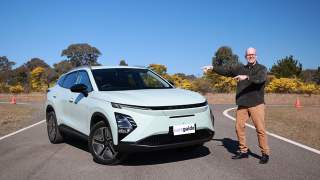
Are electric cars sustainable?
- Ford Mustang Mach E
- Electric Cars
- Ford Mustang Mach E Reviews
- Audi
- BMW
- Ford
- Tesla
- Toyota
- Volvo
- EV Advice
- Audi Advice
- BMW Advice
- Ford Advice
- Tesla Advice
- Toyota Advice
- Volvo Advice
- EV
- Electric
- Electric Cars
- Green Cars
- EVs
- Hybrid cars
- Plug-in hybrid
- Hybrid

When it comes to sustainability in the automotive industry, low or zero-emission cars such as electric vehicles do make a difference in regards to reducing greenhouse-gas emissions. When looking at the full life cycle of an EV, they are a greener option than a petrol-powered car, but harmful emissions are still generated in a variety of ways.
When it comes to electric cars, sustainability isn’t necessarily a given.
The question ‘Are electric cars better for the environment?’ seems like a clear-cut “yes” due to the fact that they don’t rely on fossil fuels to operate, but the truth, much like IKEA furniture instructions, is a little more complicated than you’d expect.
Read more about hybrid and electric cars
Yes, eco-friendly cars like hybrids and fully electric vehicles are more sustainable than your average gas-guzzler, but there are a lot of other factors to take into account, including the mining of materials needed for EVs, sustainable automotive manufacturing, the actual operation of the car and what happens once the EV reaches the end of its life cycle, and whether or not any components, such as the car’s battery, can be recycled.
Looking at the big picture, transportation, in all its forms, is responsible for 21 percent of global CO2 emissions, with road transport making up for 72 percent of that number.
Breaking things down even further, passenger cars account for 41-45 percent of road-transport emissions - about four times the amount of emissions caused by air travel - with heavy and medium-sized trucks accounting for a further 22-29 percent.


Download the EVGuide Report, 2022
Australia's one-stop snapshot of all things relating to electric cars.
The big worry, of course, is that transport emissions are expected to double by 2050, meaning immediate steps to combat that projection are required if we’re to avoid that fate.
Climate change sustainability experts Seth Wynes and Kimberly Nicholas from Sweden’s Lund University have collected data that reveals switching from a traditional internal-combustion-engined (ICE) car to an EV can result in an emission reduction of 1.19 tonnes of CO2 equivalent (tCO2e) per year, even though an EV still emits an average of 1.15 tCO2e per year.
There are several factors that play into the rather surprising fact that EVs still produce a considerable amount of CO2.

First, there’s the mining of raw materials, manufacturing, transport and running costs involved with EVs - all processes which emit their fair share of CO2 - as well as the issue of waste management once the car has reached the end of its life.
Recycling the lithium-ion batteries used in EVs by extracting rare minerals has started to become more commonplace, but it’s a difficult and expensive process that isn’t quite large scale enough yet to handle the huge global fleet of EVs on our roads.
Studies conducted in China show that manufacturing EVs generates more harmful emissions (13 tonnes of CO2) than manufacturing ICE vehicles (10.5 tonnes), which is largely due to mining raw materials for batteries.
Recycling is no better: recycling an ICE generates 1.8 tonnes of CO2, EVs 2.4 tonnes, of which 0.7 tonnes comes from recycling the batteries.
The big question, then, is whether or not the EV can offset those emissions over its lifetime, which chiefly boils down to whether it is run on electricity from clean, renewable sources, or greenhouse-gas-generating coal-fired power plants (more than 80 percent of global electricity still comes from fossil fuels).
A UK report estimated that an EV can offset its manufacturing emissions over a period of two to six years, while a Chinese study found that an EV will emit 18 percent less harmful emissions over its lifetime when compared to an ICE.
For a snapshot of how much EVs can have a positive impact in terms of lowering emissions, we only need to look to New Zealand, where over 80 percent of the energy used comes from renewables. There, EVs account for a huge 62 percent less emissions when compared to an ICE.
While there’s still a long way to go to achieve a net-zero emissions world, EVs are a step in the right direction, despite the flaws associated with them.
Sustainability goals of some of the world’s biggest car manufacturers:
Tesla sustainability

Tesla has stated that its mission is to “accelerate the world’s transition to sustainable energy”, but it does not reveal enough details about how it sources materials or manufactures its vehicles to give an accurate picture to how sustainable it actually is.
Volvo sustainability

The Volvo Group has pledged to reach net-zero greenhouse gas emissions by 2040 and to reach a rolling fleet and value chain net-zero emissions by 2050 at the latest. Its Polestar sister brand also releases life-cycle assessment reports for its vehicles, which currently claims the Polestar 2 will break even with a combustion XC40 on carbon emissions by the 112,000km mark based on it being charged up with a 'global average' power mix. Both Volvo and Polestar are using more sustainable materials in their vehicle designs, from flax to recycled aluminium. It also traces elements like lithium and cobalt from when they are extracted to when they are reclaimed from used vehicles to build a full picture of the carbon cost of these raw materials.
Toyota sustainability

Toyota is committed to reaching net zero CO2 emissions globally by 2050. Toyota’s Environmental Challenge 2050 goals include reducing global average CO2 emissions from new vehicles by 90 percent compared to Toyota’s 2010 levels, achieving zero CO2 emissions at global plants and eliminating all CO2 emissions throughout the entire vehicle life cycle.
Ford sustainability

Ford's sustainability goals include becoming carbon neutral globally by 2050, using 100 percent locally sourced renewable energy for all manufacturing plants globally by 2035, and eliminating single-use plastics from its operations by 2030.
BMW sustainability

BMW aims to have "the most sustainable supply chain in the entire sector" and aims to reduce CO2 emissions at its production facilities by 80 per cent by 2030. It also traces materials from their source in the ground, and is reducing the amount of steel which is made using power from non-renewable sources. BMW also has a closed-loop recycling plan for its battery packs, reclaiming them for lower voltage uses from old vehicles, and ultimately recycling them for their raw materials at the end of the battery's useful life.
Audi sustainability

Audi is working on a strategy to be net-zero on carbon emissions by 2050, with an aim for its factories to be carbon-neutral by 2025. To that end, the brand has introduced a 'closed loop' aluminium recycling system at its Neckarsulm site in 2017. The brand is also heavily investing in solar and wind power for its plants, and plans to produce its last combustion engined vehicle by 2026. It also uses recycled glass and other sustainable materials in its Q4 e-tron electric SUV.










Comments